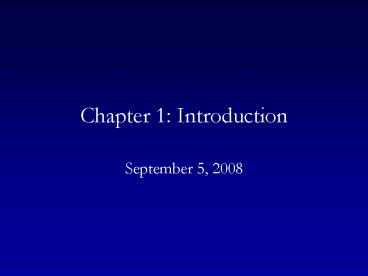Chapter 1: Introduction PowerPoint PPT Presentation
1 / 14
Title: Chapter 1: Introduction
1
Chapter 1 Introduction
- September 5, 2008
2
What is Philosophy?
1. Philosophy as love of wisdom
2. Philosophy as method
3. Philosophy as analysis
4. Philosophy as answering questions about the
world and our place in it
5. Philosophy as queen of the sciences
3
What is Science?
- Aristotles View
- Science as Method
- This is a difficult question
4
Suggestion Look at paradigm cases.
Science Physics, Chemistry, Biology,
probably Psychology, Economics,
Anthropology, etc.
5
Philosophy Metaphysical Questions 1. What
things exist? 2. What are the things like that
do exist? 3. What are the relations between
those things that exist? Epistemological
Questions 1. What is a good way to form
beliefs about the world? (e.g., what is a
rational way to form beliefs?) 2. What are the
limits of what we can know? 3. How can we be
sure about what exists? 4. What is the
relationship between how we think about things,
and how things are?
6
Philosophy Reflexive Questions 1. Why are we
conducting inquiry in this way? 2. What is this
thing that we are studying philosophically?
7
General Philosophical Questions (relating to
Science) 1. Demarcation (reflexive
questions) (e.g., what is science?) 2.
Epistemological (e.g., what is the relation
between theory and evidence?) 3. Metaphysical
(e.g., what is the world like, for example, the
nature of spacetime?)
8
General Philosophical Questions (relating to
Science) 1. Demarcation (reflexive
questions) (e.g., what is science?) 2.
Epistemological (e.g., what is the relation
between theory and evidence?) 3. Metaphysical
(e.g., what is the world like, for example, the
nature of spacetime?)
9
Descriptive vs. Normative Distinction
Example John hit someone with his
car. vs. John hit someone with his car, and he
shouldnt have.
Example Linda went to the bar last night and
sang a karaoke rendition of I Will
Survive. vs. Linda drank way too much, and then
sang an off-key karaoke rendition of I Will
Survive.
10
Descriptive vs. Normative Distinction
Example The data collected by the scientist was
such-and-such. vs. The evidence collected by the
scientist was such-and-such, which supported the
hypothesis in question.
11
Descriptive vs. Normative Distinction
Example The data collected by the scientist was
such-and-such. vs. The evidence collected by the
scientist was such-and-such, which supported the
hypothesis in question.
12
Three Themes
- Empiricism Science
- Mathematics Science
- Social Structure Science
13
Three Themes
- Empiricism Science
Empiricism The only source of real knowledge
about the world is experience. Empiricism and
Science Scientific thinking and investigation
have the same basic pattern as everyday thinking
and investigation. In each case, the only source
of real knowledge about the world is experience.
But science is especially successful because it
is organized, systematic, and especially
responsive to experience.
14
For Next Time Introduction to Logical
Positivism, Read TR, ch 2.1-2.3

